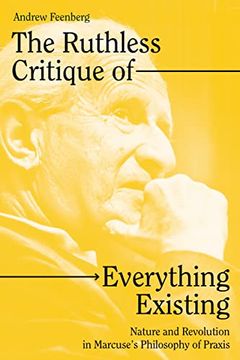Share
The Ruthless Critique of Everything Existing: Nature and Revolution in Marcuse's Philosophy of Praxis (in English)
Andrew Feenberg
(Author)
·
Verso
· Paperback
The Ruthless Critique of Everything Existing: Nature and Revolution in Marcuse's Philosophy of Praxis (in English) - Feenberg, Andrew
$ 20.15
$ 23.93
You save: $ 3.78
Choose the list to add your product or create one New List
✓ Product added successfully to the Wishlist.
Go to My WishlistsIt will be shipped from our warehouse between
Tuesday, July 02 and
Thursday, July 04.
You will receive it anywhere in United States between 1 and 3 business days after shipment.
Synopsis "The Ruthless Critique of Everything Existing: Nature and Revolution in Marcuse's Philosophy of Praxis (in English)"
How Marcuse helps us understand the ecological crisis of the 21st century For several years after 1968, Herbert Marcuse was one of the most famous philosophers in the world. He became the face of Frankfurt School Critical Theory for a generation in turmoil. His fame rested on two remarkable books, Eros and Civilization and One-Dimensional Man. These two books represent the utopian hopes and dystopian fears of the time. In the 1960s and 70s, young people seeking a theoretical basis for their revolution found it in his work. Marcuse not only supported their struggles against imperialism and race and gender discrimination, he foresaw the far-reaching implications of the destruction of the natural environment. Marcuse's Marxism was influenced by Husserl and Heidegger, Hegel and Freud. These eclectic sources grounded an original critique of advanced capitalism focused on the social construction of subjectivity and technology. Marcuse contrasted the "one-dimensionality" of conformist experience with the "new sensibility" of the New Left. The movement challenged a society that "delivered the goods" but devastated the planet with its destructive science and technology. A socialist revolution would fail if it did not transform these instruments into means of liberation, both of nature and human beings. This aspiration is alive today in the radical struggle over climate change. Marcuse offers theoretical resources for understanding that struggle.
- 0% (0)
- 0% (0)
- 0% (0)
- 0% (0)
- 0% (0)
All books in our catalog are Original.
The book is written in English.
The binding of this edition is Paperback.
✓ Producto agregado correctamente al carro, Ir a Pagar.

